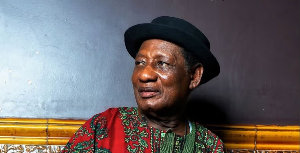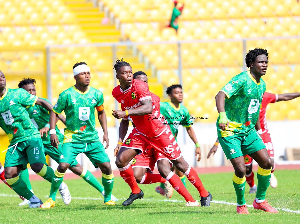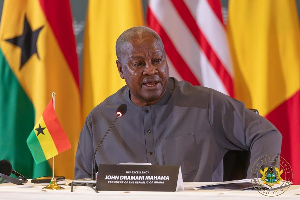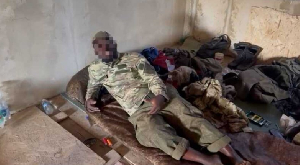BY SESHIE, STANLEY
It is said that education is the key. Sure, but for a nation with
developmental aspirations, the educational system is the key to
unlocking the potentials of the citizenry. We must therefore focus on
our educational system, as that is where the individual's key is.
Almost all who had taken the trouble to reflect retrospectively within
nagging questions of why things as they are in the country, agrees
that the blame can solely and only be laid at the doorsteps of our
educational system and for that matter their Management.
The inherited educational system strategically limits education to
reading, speaking and writing in a language, in this case, English -
the Colonial Master's language. Long after independence, our
educational system must lift the citizenry from this colonial
communication oriented intrinsic purpose to the conceptual and
pragmatic capacity of thinking relationally as well as futuristically
to undergird all our individual and national actions. That is why it
is myopic to think that when we change to reading and writing in our
own local languages, then the glaring failures of the educational
system are over. No and not all, education is not reading, speaking
and writing in a language - your favorite language.
Nevertheless, there are sure advantages in communicating one's local
language. So there is the need to expand the vocabulary-base of the
local languages to accomodate concepts across the spectrum of
knowledge organization, particularly in the sciences, mathematics,
arts and humanities. I once looked up some popular words in Ewe
dictionary and in fact, it was not helpful at all because most of the
words were not word-to-word mapping per translation. They are more of
what I will call word-to-sentence translation mapping.
For instance, science as a word in English language does not have a
concise similar correspondence in Ewe. Rather it had a sentence that
is almost the general generic meaning (dzor dzor me nunya nya). So
that I do not know how the statement "this is unscientific" will be
translated. Also it makes one wonder how branches of science as well
as various topics of engagement under them during the course of
learning and teaching shall be. The same applies to mathematics, which
is also an umbrella of many varied parts. The closest Ewe word I
verbally encountered since childhood is "aconta" which sounds more
like a business financial terminology; Accounting, than what it
purports to translate. At least in Ewe examples abound, and I am sure
it cut across all local langauges as well.
I recalled Kojo Oppong Nkrumah hosted Kofi Wayo on Breakfast Show on
Joyfm somewhere in 2009/10. When after the main discussion, the host
queried Kofi Wayo as to whether he can still speak his mother tongue,
Fante or not. As usual, Kofi Wayo responded amidst laughter, that, of
what use is the Fante language to him in a world ruled and driven by
scientific and mathematical concepts. To cap it, Kofi Wayo went on to
ask the host, what is the Fante word for thermodynamics, to which, as
expected there was no response than laughter from Kojo Oppong Nkrumah.
These deficiencies of word-to-word mapping in our local languages to
necessarily use for most conceptual terminologies or registers of
various bodies of organized knowledge that have become so common to
have even been absolved of their technicalities in the public domain
must be worked on by Experts in the local languages before the
transition is ever made.
The biggerpicture is that, whilst some educationists, as recently
reiterated by the Minister of Education, Nana Opoku Agyemang, would
like to see the language of education changed from the foreign to
local ones. It seems that they are doing almost nothing to
incorporating as in translating or adopting the indispensable concepts
pervading bodies of organised knowledge into our local languages in
order to enrich and enhance conversation to even begin with. We cannot
in the mere interest of teaching in the local languages push the
citizenry into an insufficient or almost empty set of concepts needed
for education.
Meanwhile, the truth is it is our educational system itself rather
than the language of instruction that needs overhauling. Education is
not reading, speaking and writing in a language, but more importantly
the ability to think in and with the language. When education is
redefined and accordingly operationalised contextually to promote
individual and cooperative thinking, the issue of language of
instruction will become secondary and probably irrelevant to occupy
our attention. Whether the child is taught in the foreign or local
language, the most important goal is for the educational system to
awaken and encourage the analytic and synthetic thinking needed to
unlock one's inherent potentialities to the benefit of the nation in
the ever evolving modern world.
Anything other this is not education, and this is the intrinsic
conundrum of our educational system. It is ironic that our educational
system had been stifling curiosity and as such hardly promotes
thinking. Any wonder that we have leaders who can read, speak and
write in language (foreign or local), yet their national consequential
actions shows nothing than their command of the language, not the
fruit thereof - thinking. Therefore, the blunder in Ghana is the
educational system that operationally and essentially defines
education as reading, speaking and writing in a language - misleading
many, including those who should even know better, to believing that
changing the language of education from English to the local language
is the panacea.
Email: seshiehanku@gmail.com
Facebook: Stanley Seshie
Whatsapp: 0508951313
Opinions of Monday, 26 October 2015
Columnist: Seshie, Stanley
Which is the Blunder? The Educational System or the Language of Education in Ghana?
Entertainment













